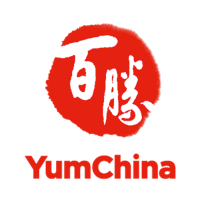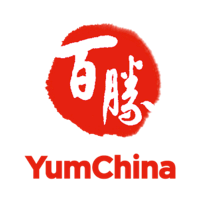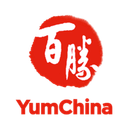
Yum China Holdings Inc
NYSE:YUMC


| US |

|
Johnson & Johnson
NYSE:JNJ
|
Pharmaceuticals
|
| US |

|
Berkshire Hathaway Inc
NYSE:BRK.A
|
Financial Services
|
| US |

|
Bank of America Corp
NYSE:BAC
|
Banking
|
| US |

|
Mastercard Inc
NYSE:MA
|
Technology
|
| US |

|
UnitedHealth Group Inc
NYSE:UNH
|
Health Care
|
| US |

|
Exxon Mobil Corp
NYSE:XOM
|
Energy
|
| US |

|
Pfizer Inc
NYSE:PFE
|
Pharmaceuticals
|
| US |

|
Palantir Technologies Inc
NYSE:PLTR
|
Technology
|
| US |

|
Nike Inc
NYSE:NKE
|
Textiles, Apparel & Luxury Goods
|
| US |

|
Visa Inc
NYSE:V
|
Technology
|
| CN |

|
Alibaba Group Holding Ltd
NYSE:BABA
|
Retail
|
| US |

|
3M Co
NYSE:MMM
|
Industrial Conglomerates
|
| US |

|
JPMorgan Chase & Co
NYSE:JPM
|
Banking
|
| US |

|
Coca-Cola Co
NYSE:KO
|
Beverages
|
| US |

|
Walmart Inc
NYSE:WMT
|
Retail
|
| US |

|
Verizon Communications Inc
NYSE:VZ
|
Telecommunication
|
Utilize notes to systematically review your investment decisions. By reflecting on past outcomes, you can discern effective strategies and identify those that underperformed. This continuous feedback loop enables you to adapt and refine your approach, optimizing for future success.
Each note serves as a learning point, offering insights into your decision-making processes. Over time, you'll accumulate a personalized database of knowledge, enhancing your ability to make informed decisions quickly and effectively.
With a comprehensive record of your investment history at your fingertips, you can compare current opportunities against past experiences. This not only bolsters your confidence but also ensures that each decision is grounded in a well-documented rationale.
Do you really want to delete this note?
This action cannot be undone.

| 52 Week Range |
29.24
51.46
|
| Price Target |
|
We'll email you a reminder when the closing price reaches USD.
Choose the stock you wish to monitor with a price alert.

|
Johnson & Johnson
NYSE:JNJ
|
US |

|
Berkshire Hathaway Inc
NYSE:BRK.A
|
US |

|
Bank of America Corp
NYSE:BAC
|
US |

|
Mastercard Inc
NYSE:MA
|
US |

|
UnitedHealth Group Inc
NYSE:UNH
|
US |

|
Exxon Mobil Corp
NYSE:XOM
|
US |

|
Pfizer Inc
NYSE:PFE
|
US |

|
Palantir Technologies Inc
NYSE:PLTR
|
US |

|
Nike Inc
NYSE:NKE
|
US |

|
Visa Inc
NYSE:V
|
US |

|
Alibaba Group Holding Ltd
NYSE:BABA
|
CN |

|
3M Co
NYSE:MMM
|
US |

|
JPMorgan Chase & Co
NYSE:JPM
|
US |

|
Coca-Cola Co
NYSE:KO
|
US |

|
Walmart Inc
NYSE:WMT
|
US |

|
Verizon Communications Inc
NYSE:VZ
|
US |
This alert will be permanently deleted.
 Yum China Holdings Inc
Yum China Holdings Inc
Yum China Holdings Inc
Investor Relations
Yum China Holdings Inc., born from the split of its parent company Yum! Brands in 2016, quickly became a formidable player in the world of fast food in China, a land known for its dining diversity and explosive economic growth. This savvy spin-off managed a unique alchemy, blending Western brands with the local palate through household names like KFC and Pizza Hut. As the vast and varied Chinese market opened its doors wider, Yum China strategically expanded its reach across bustling cities and burgeoning towns. With every crispy chicken leg and cheesy slice, they began grasping the nuances of local tastes and dining habits, going beyond mere adaptation and evolving into an integral part of China's food culture.
Central to Yum China's business model is its ability to merge the robust efficiency of a global fast-food chain with a locally attuned approach to business. They generate revenue through a sprawling network of company-owned and franchised stores, leveraging their presence in high-traffic locations. With a keen focus on digital innovation, Yum China has embraced cutting-edge technology to refine its customer engagement, from mobile ordering to specialized dietary options. Their prosperity isn't just based on serving food; it's about creating a seamless, delightful dining experience tailored to the ever-evolving expectations of Chinese consumers. In the process, Yum China capitalizes on cost efficiencies and scale, reinforcing its standing as a significant player in the competitive landscape of quick-service restaurants.

Yum China Holdings Inc., born from the split of its parent company Yum! Brands in 2016, quickly became a formidable player in the world of fast food in China, a land known for its dining diversity and explosive economic growth. This savvy spin-off managed a unique alchemy, blending Western brands with the local palate through household names like KFC and Pizza Hut. As the vast and varied Chinese market opened its doors wider, Yum China strategically expanded its reach across bustling cities and burgeoning towns. With every crispy chicken leg and cheesy slice, they began grasping the nuances of local tastes and dining habits, going beyond mere adaptation and evolving into an integral part of China's food culture.
Central to Yum China's business model is its ability to merge the robust efficiency of a global fast-food chain with a locally attuned approach to business. They generate revenue through a sprawling network of company-owned and franchised stores, leveraging their presence in high-traffic locations. With a keen focus on digital innovation, Yum China has embraced cutting-edge technology to refine its customer engagement, from mobile ordering to specialized dietary options. Their prosperity isn't just based on serving food; it's about creating a seamless, delightful dining experience tailored to the ever-evolving expectations of Chinese consumers. In the process, Yum China capitalizes on cost efficiencies and scale, reinforcing its standing as a significant player in the competitive landscape of quick-service restaurants.





























 You don't have any saved screeners yet
You don't have any saved screeners yet
